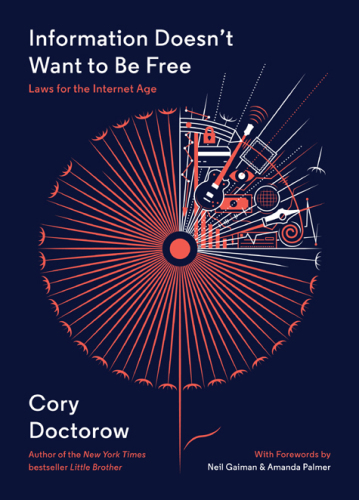
Information Doesn't Want to Be Free
Laws for the Internet Age
کتاب های مرتبط
- اطلاعات
- نقد و بررسی
- دیدگاه کاربران
نقد و بررسی

Starred review from September 15, 2014
The Internet has expanded and cluttered the debate over intellectual property with technical terms and special interests, but Doctorow (Rapture of the Nerds), co-editor of the popular blog Boing Boing and a contributor to Publishers Weekly, breaks down some of the most fundamental concepts at work into plain language. The book is organized around Doctorow’s Three Laws, which consider DRM (digital rights management, which Doctorow simplifies to “digital locks”), piracy versus obscurity, and the way copyright ought to work. He excels at translating complex issues into pithy, digestible phrases, and challenges readers to rethink the idea of copyright and who it is meant serve. Doctorow argues that, rather than doing away with copyright as we know it, we need to rethink the way that it is enforced. He deftly explains how an open Internet directly affects freedom of speech and freedom of the press, and why censorship doesn’t solve problems. Equal parts manifesto and field guide, Doctorow’s primer for artists and creators delivers a healthy dose of clarity to the debate. Agent: Russell Galen, Scovil Galen Ghosh Literary Agency.

Starred review from July 15, 2014
In his best-selling novel Ready Player One,Ernest Cline predicted that decades from now, Doctorow (Homeland, 2013,etc.) should share the presidency of the Internet with actor Wil Wheaton.Consider this manifesto to be Doctorow's qualifications for the job.The author provides a guide to the operation of the Internetthat not only makes sense, but is also written for general readers. Usingstraightforward language and clear analogies, Doctorow breaks down the complexissues and tangled arguments surrounding technology, commerce, copyright,intellectual property, crowd funding, privacy and value-not to mention thetricky situation of becoming "Internet Famous." Following a characteristicallythoughtful introduction by novelist Neil Gaiman, rock star Amanda Palmer offersa blunt summary of today's world: "We are a new generation of artists, makers,supporters, and consumers who believe that the old system through which weexchanged content and money is dead. Not dying: dead." So the primary thesis ofthe book becomes a question of, where do we go from here? Identifying the Web'sconstituents as creators, investors, intermediaries and audiences is just thefirst smart move. Doctorow also files his forthright, tactically savvyarguments under three "laws," the most important of which has been well-broadcast:"Any time someone puts a lock on something that belongs to you and won't giveyou the key, that lock isn't there for your benefit." These aren't thewild-eyed proclamations that arose from the Occupy movement or the hysteriathat seems to surround Edward Snowden, whom Doctorow touches on only brieflyhere. Instead, the author advocates for a liberalized system of copyright lawsthat finally admits that the Internet, for all its virtues and diversepurposes, is nothing but one great big copy machine, and it's not going away.Doctorow has spoken and written on these issues many timesbefore but never quite so persuasively. Required reading for creators makingtheir ways through the new world.
COPYRIGHT(2014) Kirkus Reviews, ALL RIGHTS RESERVED.

Starred review from December 1, 2014
Doctorow (Pirate Cinema; Little Brother; Rapture of the Nerds) mentions so many past careers in this title that he's hard to describe. Suffice to say that his history makes him an authority on the creation, sale, distribution, and consumption of various kinds of artistic media. Here the author distills the benefit of his experiences into three laws, to wit: digital locks are not for the benefit of the creators of the material they "protect"; "Fame Won't Make You Rich, But You Can't Get Paid Without It"; and "Information Doesn't Want to Be Free, People Do." Much of the material will make readers more conscious of facts they already had some awareness of: that record companies rip off artists, for example. Doctorow will also make all but the most savvy consumers aware of outrages they had no idea about--for example, that those companies deduct from artists' royalties for "breakage" (physical damages caused by shipping), even when they sell digital music. VERDICT Each of the miniessays and lengthy sidebars Doctorow offers in support of his laws is an education in itself. The entries are perfect for standalone examinations in library science classrooms, where students will take away an important lesson: copyright is broken, given that computers work by creating copies (opening a web page, for example, creates a copy of it on the user's hard drive). Mainly, though, his nonstop barrage of hard-won information-age wisdom is for everyone who consumes copyrighted material today--which is everyone.--Henrietta Verma, Library Journal
Copyright 2014 Library Journal, LLC Used with permission.

























دیدگاه کاربران